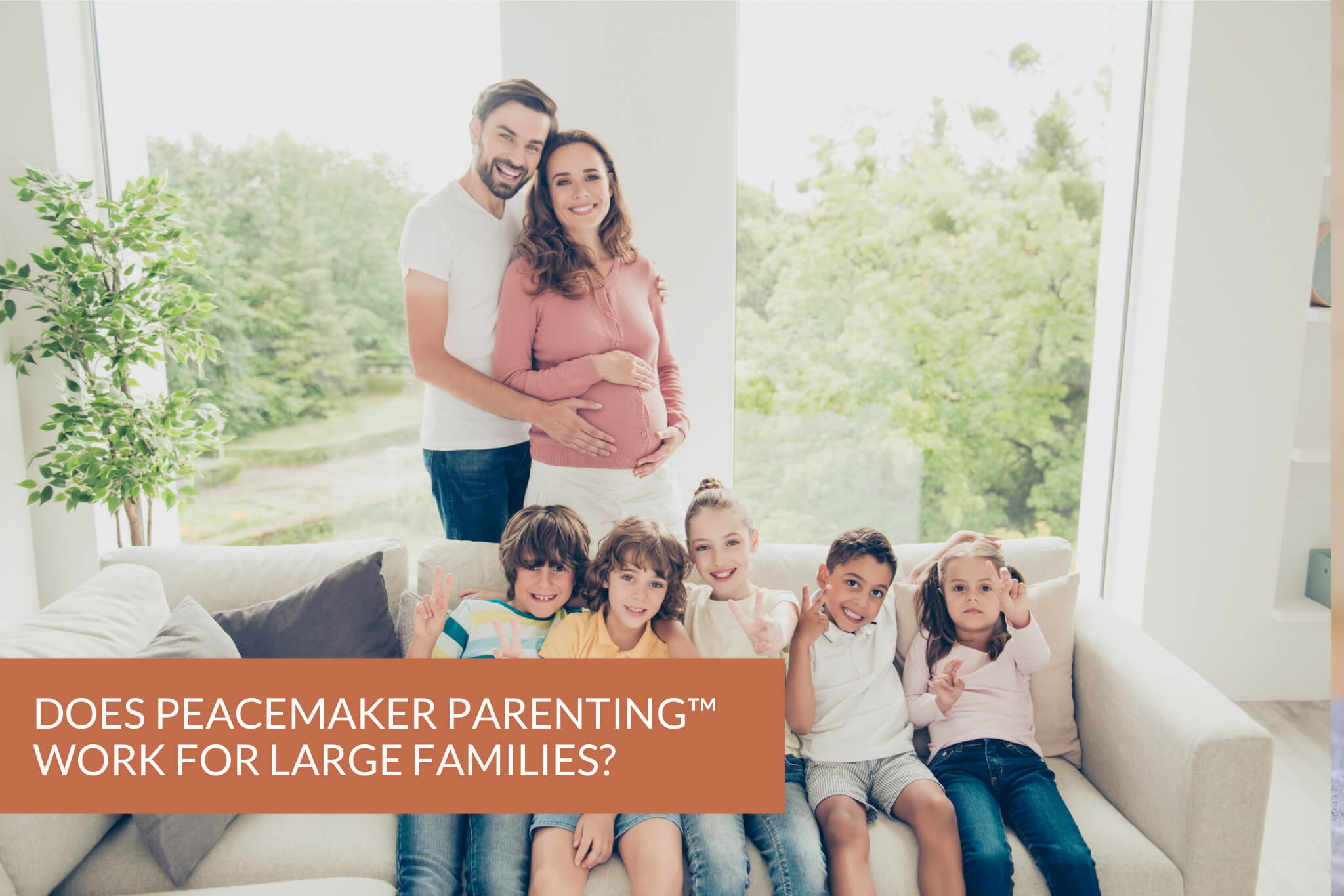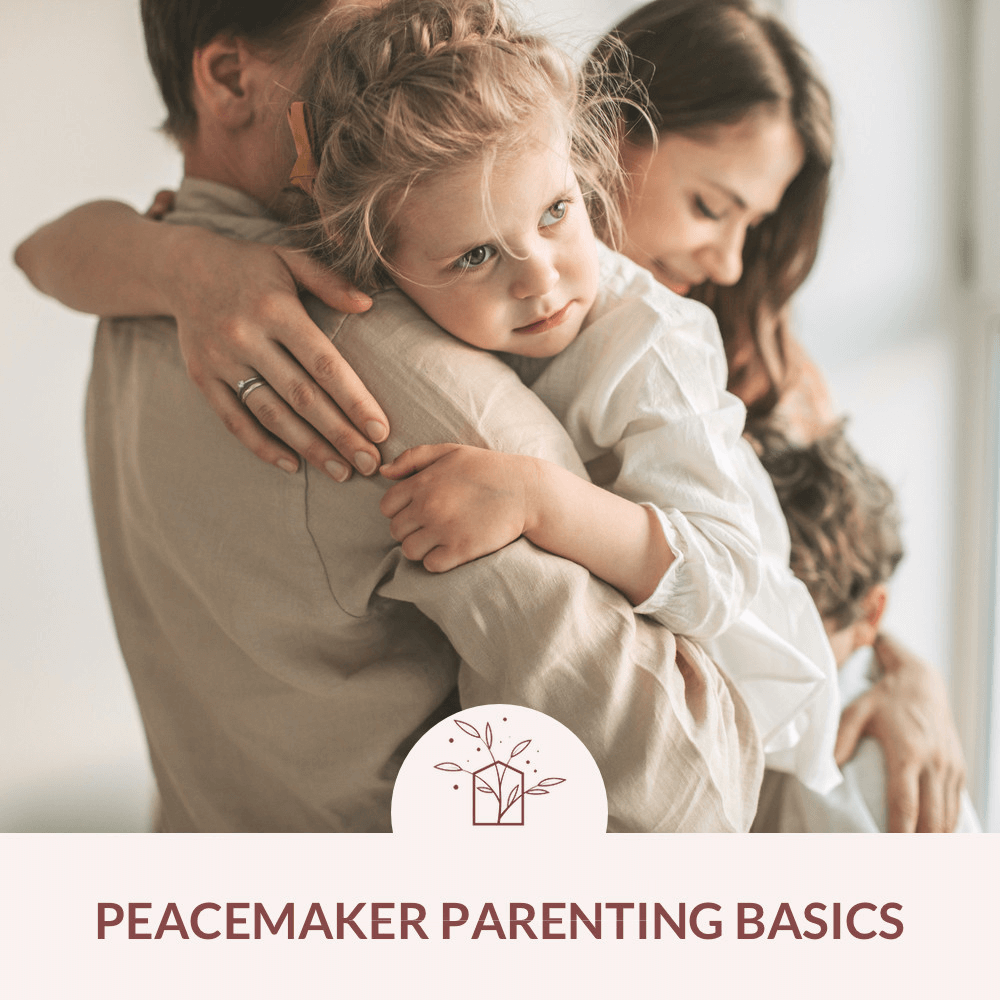
Does Peacemaker Parenting Work for Large Families?
Christian parents often look to authors and social media influencers for inspiration, support, and guidance on their parenting journeys. Many Christian influencers with large families (up to interpretation, but we’ll say four or more children) provide parenting examples that include time outs, spanking, and other punishment/reward systems that seem to work well for them in managing their large broods. If some of these strategies don’t feel right to you–fear not! There is another way that can lead to beautiful, fruitful relationships with your many children–and, yes, a peaceful home with healthy boundaries as well. Let’s dive in!
What is Peacemaker Parenting?
Peacemaker Parenting is a model for parenting that is rooted in the teachings of Jesus and backed by modern neuroscience. It equips parents and caregivers to develop deeply connected and secure relationships with their children, and empowers them with tools and strategies to lead and guide their families with Jesus, and His grace, at the center of their homes and families. You can learn more about Peacemaker Parenting here.
At its core, it seeks to build strong emotional connections between parents and children by valuing each child's individuality and unique needs. Central to parenting as a peacemaker is the belief that children thrive in a relationship of trust and mutual respect.
Instead of using disciplinary methods like punishment or coercion, peacemaker parenting advocates for positive discipline techniques that focus on guidance, cooperation, and building skills and habits. By setting clear boundaries, offering choices, and using natural consequences, parents can help their children learn and grow in a supportive and nurturing environment.
This relationship-driven approach also encourages autonomy and independence by allowing children to explore and learn from their experiences while providing a safe and loving framework for growth. Ultimately, this style of parenting aims to cultivate strong, trusting relationships between parents and children, laying the foundation for healthy emotional development and lifelong well-being.
The Benefits of Peacemaker Parenting in Large Families
In Peacemaker Parenting, we work to reframe the end goal of parenting from control and blind obedience to trust and collaboration. When it comes to larger families, though, many parents worry that if spanking, time outs, and other punishments are off the table, chaos will ensue, and parents will be stretched too thin to be able to emotionally support so many kiddos at once.
Thankfully, since Peacemaker Parenting seeks to address the underlying needs children express, rather than simply punishing external behavior, it can actually make parenting easier and the culture within the home more peaceful. Here’s more on the benefits of Peacemaker Parenting for large families:
- Promotes Stronger Family Bonds: Peacemaker Parenting emphasizes building trust, empathy, and connection between parents and children. In a large family, where individual attention may be divided, this approach helps strengthen the bonds between family members. Children feel valued, heard, and respected, fostering a sense of belonging and unity within the family.
- Encourages Positive Communication: Peacemaker Parenting prioritizes open and respectful communication. In a large family setting, where conflicts and misunderstandings may arise more frequently simply because there are more people and more needs, this approach promotes healthy dialogue and problem-solving skills. Children learn from an early age to express their thoughts and feelings constructively, leading to fewer misunderstandings and resentments among siblings.
- Fosters Emotional Resilience: Peacemaker Parenting focuses on understanding and validating children's emotions. In a large family, where emotions can run high, this approach teaches children to recognize, regulate, and express their feelings in healthy ways that respect each person involved. By acknowledging and empathizing with their emotions, parents help children develop emotional intelligence and resilience, essential skills for navigating relationships and life's challenges.
- Reduces Power Struggles and Resistance: Peacemaker Parenting avoids authoritarian methods of discipline, such as punishment and coercion, which can lead to power struggles and resistance from kids. Instead, it emphasizes collaboration, problem-solving, and mutual respect. In a large family, where parental authority may be stretched thin, this approach minimizes conflict and encourages cooperation among siblings.
- Promotes Autonomy and Responsibility: Peacemaker Parenting empowers children to make decisions and take responsibility for their actions. In a large family, where tasks and responsibilities may need to be shared, this approach encourages children to contribute to the household in meaningful ways. By involving kids in decision-making and problem-solving processes, parents foster a sense of autonomy and independence, preparing them for adulthood.
- Creates a Positive Learning Environment: Peacemaker Parenting prioritizes positive reinforcement and encouragement over criticism and punishment. In a large family, where kids may have varying learning styles and needs, this approach creates a supportive and nurturing learning environment. Children feel motivated to explore, experiment, and learn from their mistakes, without fear of judgment or reprimand.
- Encourages Spiritual Formation: Since in Peacemaker Parenting, the parent/child relationship is based on trust, not fear, nurturing a sincere understanding of God’s trustworthiness and love for us is a natural next step. This guides children in not simply learning to blindly obey parents (and/or God), but nurtures a robust approach to spiritual formation through consistent discipleship - in big and little moments.
Overall, Peacemaker Parenting offers an informed and compassionate approach to raising children in large families, promoting harmony, understanding, and mutual respect among family members.
What does it look like in action?
Both of my young children are melting down at once. What do I do?!
First, breathe. If there is a safety issue, attend to that first, but otherwise realize that the best thing you can do is regulate yourself so you can share your calm, instead of joining their chaos. The key here isn’t to try to stop each child from being upset, it’s to help them coregulate with you, and feel seen by you so they can safely work through being upset. (Be a bridge, not a stop sign.) )There are multiple ways to do this, and it’ll depend on what your kids need in that moment, but you might try physically meeting the youngest child’s needs by picking them up to cuddle and offer a few words of support. Then offer to hold hands with or stroke the face of your older child and verbally empathize with their struggle and share your presence. “I’m so sorry that happened. I’m here for you. Whenever you’re ready to talk, I’m ready to listen.” When most of those feelings have been released (everyone’s calm), you can try to lead a conversation that will help them reflect and process what happened. “I was so surprised that we were all out of cookies. It really was disappointing! Pushing your brother down because you felt mad isn’t okay. I think that hurt his feelings and his body, didn’t it? It's okay to be mad, and I'm going to help you learn how to be mad and respectful at the same time. What could you try doing instead, the next time you’re mad?”
Where the conversation goes from there will reflect your child's personality, temperament, and emotional and sensory needs. Once you agree on a healthy and respectful response to try next time, give your little one lots of opportunities to practice. This is where role-playing, storytelling, and pretend play with toys can be a powerful way to help your child learn the skills needed to try to do better in the future.
It's important to remind your child that they probably will mess up again, and you will be there to help them just as Jesus is there to help you (and them) in hard moments.
I need to finish making dinner but my twin toddlers get into everything and I get so frustrated I end up yelling.
Peacemaker Parenting isn’t permissive parenting–we believe boundaries are necessary and good! Sometimes that looks like verbal boundaries “I can’t let you use a knife,” “You need to find a stopping place in your project or we won’t have time to read stories.” Sometimes kids need physical boundaries, and almost always so when it comes to safety reasons. It is okay for you to put a loving boundary in place like a baby gate in front of the kitchen, or create a safe “yes space” for your child to play in while you step away for a few minutes. They may protest a little at first but you can empathize with them verbally “Oh, you want to come in the kitchen, I hear that! When I put the lasagna in the oven I'll be able to let you in again. I know this is hard! I’ll be with you as soon as I can.” You’ll be less frustrated (and probably finish what you’re doing faster) without them in there, and be better able to maintain your composure with them if your need to open the oven safely is met.
Want to learn more about Peacemaker Parenting? Our 1 hour workshop is an introduction to the core principles and foundations of Peacemaker Parenting and is full of practical tools and strategies for leading your family with peace and grace:














0 Comments